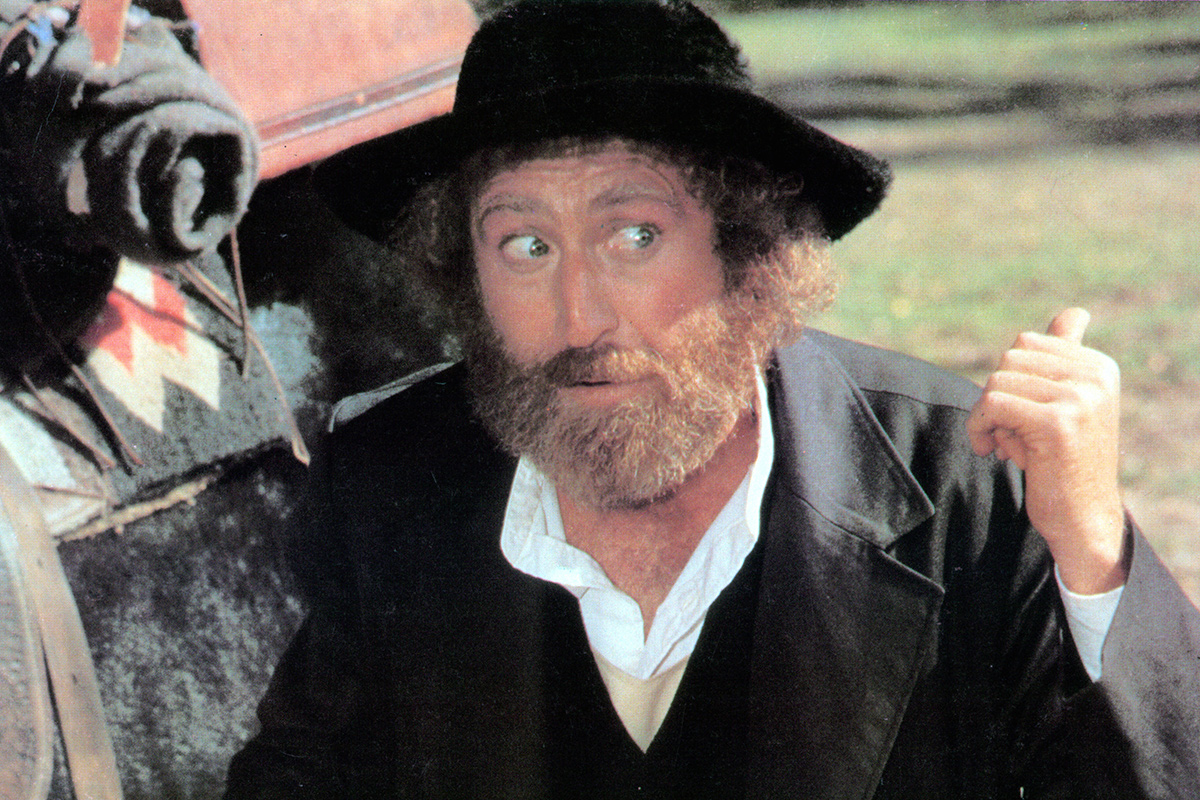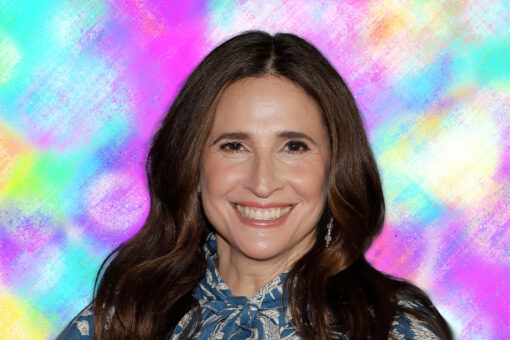Being Orthodox often means feeling like an outsider. Growing up in an insulated community means that you get to regularly see other people sharing your practices, your ways of dress, your dietary requirements. But then you leave. You take the trip to Hershey Park, where you try to spot bearded men in baseball caps so you can pull them to the side for a mincha minyan (gathering for afternoon prayer) as crowds mill around you. You go off to college, where you eat a couple of grapes at the event that didn’t order kosher food. You leave town and you tuck in your tzitzit or wear a denim skirt, you watch what you say, you worry about being watched.
The first time I remember seeing an Orthodox Jew in a Hollywood movie was in 1979’s “The Frisco Kid,” a fish-out-of-water/buddy Western film starring Gene Wilder and Harrison Ford. Wilder plays Avram Belinski, a Polish rabbi traveling across the U.S. to go to a Jewish community in San Francisco, where he will give them a sefer Torah (Torah scroll), lead their congregation and marry the daughter of the synagogue’s president. Like many a Western hero, Avram ain’t from around here, and it shows. He sticks out with his hat and his beard, his accent and his broken English, and his strict adherence to Torah practices. And he is always being watched.
Early on in the film, Avram mistakes a group of Amish farmers for Hasidim, ultra-Orthodox Jews — to be fair, the hats, beards and general garb are very similar when seen from a distance — and ultimately befriends them. Just before he leaves, Avram davens Shacharit (prays the morning prayer), and we see Wilder swaying back and forth in a tallit and tefillin. It’s in this moment where we see him glance aside, spotting the Amish kids who can’t believe what they’re seeing (“I think he’s crazy”). It doesn’t stop Avram from praying, because that’s just part of who he is (fun fact: You can tell based on the verse he ends with that the scene takes place on a Thursday!).
In this film moment, I felt seen because, as a Jew, I know I’m being watched. When a Jewish school goes on a field trip, the administrators warn the students that they are representing all Jews everywhere. To misbehave is to desecrate the holy name of Hashem, we are told. A Jew can feel the glares of people noticing the clothing that makes them stand out. We’ve had people say “mazel tov” or “Shabbat shalom” to us with no contextual reason, other than to tell us that they’ve noticed we’re Jewish. Thanks.
The conspicuous Jew of “The Frisco Kid” soon finds himself an unlikely companion. Early on in Avram’s travels, he chases a chicken: “I don’t want to hurt you, I just want to make you kosher!” He’s having equally bad luck trying to spear a fish in the water when Tommy Lillard (Ford) finds him. A scoundrel and a bank robber, Tommy takes pity on Avram and his struggle to survive, and becomes an unexpected friend. The two turn a bickering friendship into a blossoming bromance (“Come here, darling,” Tommy says, as the two cuddle for warmth on a frigid winter night), and it’s really something beautiful to watch (there’s fanfiction!).
What is especially touching about their friendship is the way it so often hinges on Avram’s staunch observance and unwillingness to break Torah law (for the most part — the movie doesn’t get all of its halacha right, but it does pretty well). He won’t ride on Shabbos, he’ll risk his life for a Torah, he will not accept stolen money. “The Frisco Kid” does not present Avram’s religious faith as an obstacle to be overcome; his challenge is to continue upholding the tenets of his beliefs. And Tommy, as frustrated as he gets, keeps watching and following Avram through troubles and woes, all the way to San Francisco, because he just can’t resist accompanying a man of principle.
Racial representation in “The Frisco Kid” ages poorly — it includes one character who uses a heavy, stereotypical Chinese accent, and another who is Native but played by a white Italian — but its interactions stem from an idealistic vision of mutual respect among the disenfranchised. (Idealistic is the key word here — Jews’ history with race relations is far from impeccable.) From his encounter with the Amish, to meeting members of other ethnic minorities working on a railroad, to a monastery of silent monks, to a tribe of Native Americans, Avram meets people who face discrimination and judgment, and he refuses to judge them harshly. This sense of understanding among those othered by American society breeds hope for modern intersectional alliances.
While rewatching, I tried to get back into the mindset of being young and first seeing this Orthodox Western, and to understand how I reacted. As I recall, I was 10 years old, the movie was on a borrowed DVD and I was living in Israel. Before high school, my family relocated between Israel and New York six times in as many years. It’s hard to parse if I felt like such an outsider because I kept having to adapt to different social environments, or if I just felt that way because I preferred to stay inside and read instead of being social.
Whether or not I picked up on Avram’s outsider status when I was younger, I really felt it during this recent viewing. Even inside his own community, he doesn’t quite fit. Out of 88 students in the yeshiva, he finished “a close 87.” The first time we see him, he’s outside dancing on the ice, while a stone-faced panel of rabbis deliberates indoors. Avram is like many within Orthodox Judaism; he’s a reminder that the label does not connote a monolith. His clothing is judged by non-Jews and Jews alike, and his journey is one of American hybridization, much like the path of a Jew trying to determine the boundaries of the “modern” and the “Orthodox” in their life.
I love “The Frisco Kid” despite its poor critical ratings (nu, there are better Westerns, but so what?), a sign that there’s room for it to get some more love. I love that it sends Avram on a journey to a new land and through fire. I love that he suffers and makes mistakes. I love that it exists. And I love that we will always have Harrison Ford saying “Oy gevalt!” and Gene Wilder singing the song of another Thursday.
Late Take is a series on Alma where we revisit Jewish pop culture of the past for no reason, other than the fact that we can’t stop thinking about it?? If you have a pitch for this column, please e-mail submissions@heyalma.com with “Late Take” in the subject line.




